Let’s say …

One of my long-time students, who is extremely fluent in English, has recently started to pepper her conversation with the phrase let’s say. This just didn’t sound quite right to me, but why? I did some thinking about three common conversational phrases that can sometimes be confusing.
First of all, let’s say, by itself, has a fairly narrow meaning. We use it to introduce a suggestion or a hypothetical situation.
It’s a beautiful day. Let’s say we go to the park and have a picnic.
Let’s say you had a million dollars … would you spend it on a trip around the world or a new house?
♥ ♥ ♥ ♥ ♥ ♥
Then there’s let’s just say. Because English speakers tend to run these words together, you might think you’re hearing let’s say. Here’s what let’s just say usually sounds like.
This common phrase let’s just say can be used to convey different meanings.
You can use it to provide a sort of summary of what you’ve just said, where you aren’t providing all the details.
The traffic to the airport was so heavy I missed my flight. Then I found out I’d left my phone charger at home and couldn’t call to cancel my hotel reservation. Let’s just say the trip was a complete disaster.
Speaker 1: How was your first date with Vincent last night?
Speaker 2: Let’s just say it was also my last date with Vincent.
You may also use let’s just say after a discussion, especially one during which you’ve been arguing.
Let’s just say we agree to disagree.
Let’s just say we’re never going to come to a consensus about this.
Or you can use it to question an assumption that you might disagree with.
Let’s just say that we do end up getting to the movies late. Does it matter? They always show lots of previews before the film starts anyway.
♥ ♥ ♥ ♥ ♥ ♥
Another helpful conversational phrase is I mean. This is a common discourse marker that we use to clarify, correct, repeat, or add additional information to something we’ve just said. It can also be used to justify or explain your previous statement.
I’m not sure why I don’t like the new teacher. I mean, it seems like she tries to explain things … but I just don’t think she’s very clear.
I don’t think we should bother going to the movies. I mean, it’s getting so late we’ll miss the first half.
I really don’t like my boss. I mean, she seems to criticize everyone without any good reason.
Don’t confuse I mean with I mean it. I mean it emphasizes the truth of what you just said. (Parents seem to use this phrase a lot.)
To a child: If you don’t clean up your room right now, we aren’t going to the zoo. I mean it!!
Or if someone doesn’t believe what you said, especially if it’s a compliment …
Man: That dress looks beautiful on you.
Woman: Seriously? It doesn’t. It makes me look fat.
Man: No, you look gorgeous. I mean it!
Relax is not a noun
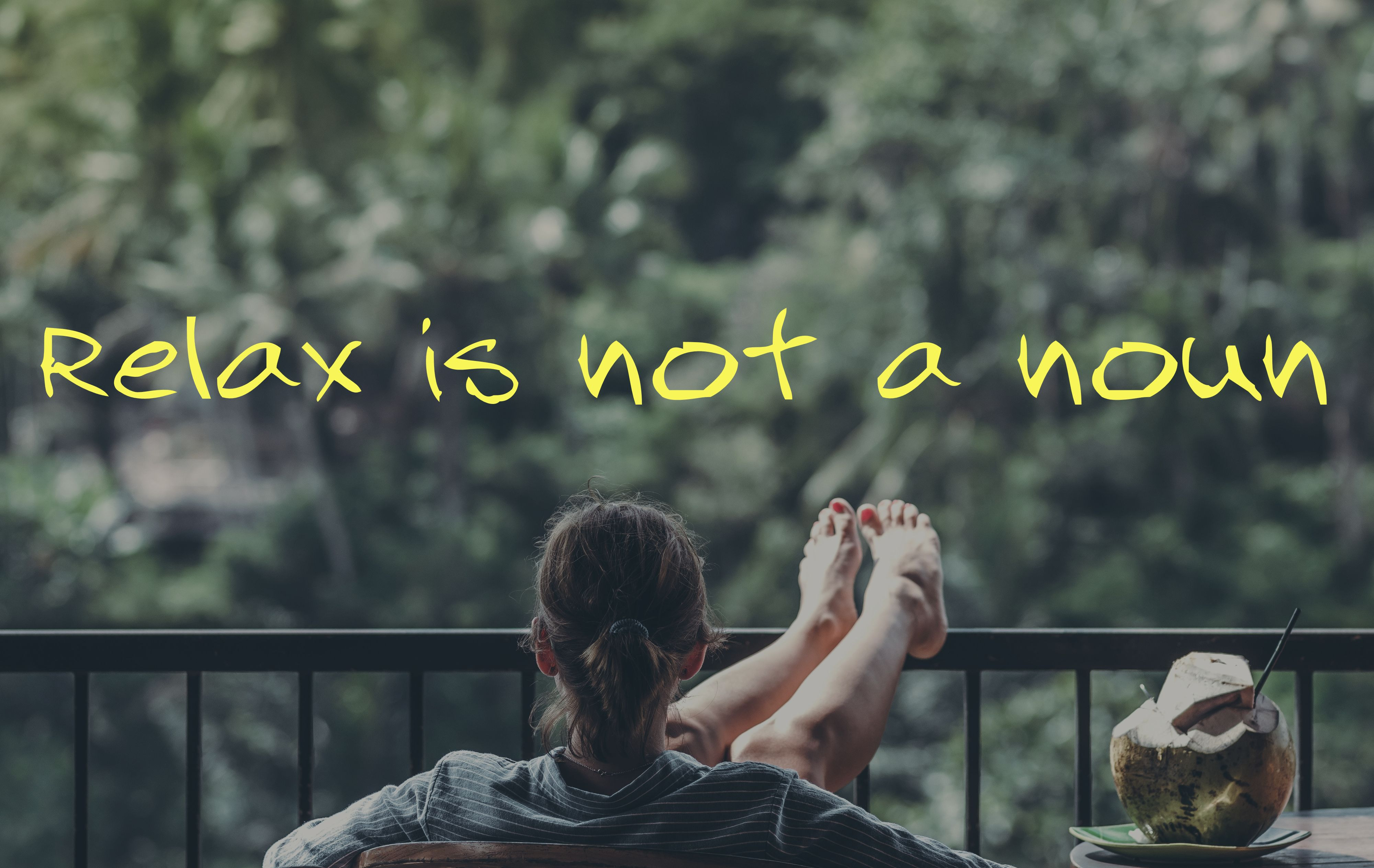
If I had a dollar for every time I heard an English learner say to have a relax or a relax time, I’d be rich!
The key point is that relax can never be used as a noun.
To relax is a verb.
I relaxed by taking a hot shower.
Students relax by playing video games.
We can relax after we finish studying.
Relaxing and relaxed are participial adjectives.
We had a relaxing time on vacation.
We felt so relaxed on vacation.
You can use the verbals, to relax and relaxing, as the subject or direct object in most cases.
I like to relax in the evening.
Relaxing is my favorite activity.
Relaxation is the noun form of relax.
Everyone needs some form of relaxation in their life.
Relaxation is as important as medication in treating high blood pressure.
But there are lots more fun and interesting ways to talk about relaxing.
For example, you can say that students need a little R & R (rest and relaxation).
You might also need to unwind, kick back, take a break, take it easy, have some downtime, and chill out.
And how to describe those situations that make us want to relax?
We can say that our lives are hectic, stressful, exhausting, draining, and nerve-wracking.
In these situations, we may feel stressed out, wiped out, pressured, frazzled, and wound-up.
Finally, how about some idioms that we can use to describe feeling stressed and feeling relaxed?
You can say that you feel tired as a dog, or dog-tired.
At the end of a long day, you might feel beat. Or bushed. Your work day was a real pressure cooker!
You might feel you need to take a chill pill. Or chillax. Or put your feet up.
It feels good to mellow out, let your hair down, and find your happy place.

Three points, not three reasons
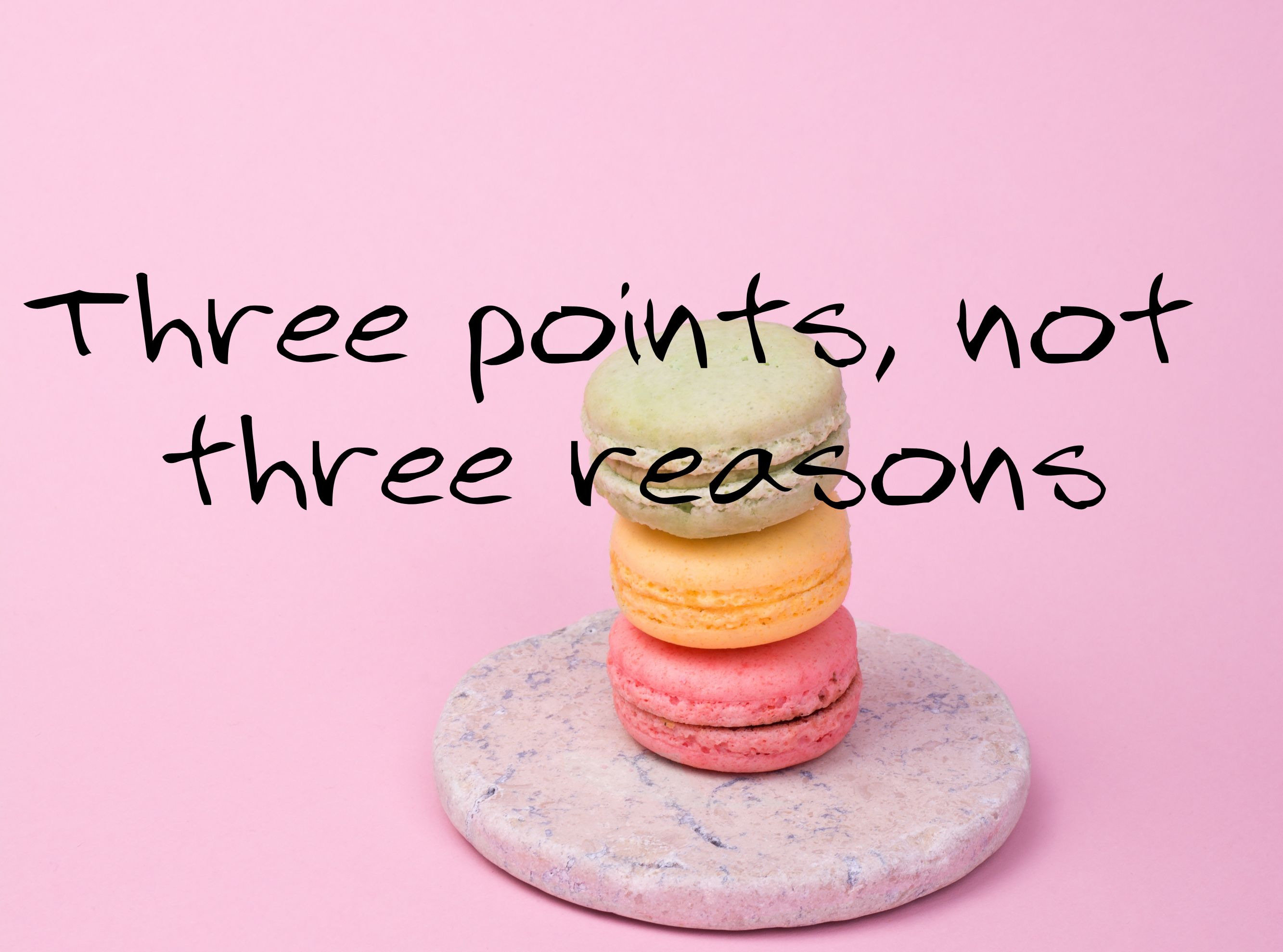
It’s time to write the TOEFL independent essay. Last section of the test … I’m almost done! I take a deep breath, look at the question, and …. blank out! What in the world can I say? I don’t have any ideas!
This is a common complaint of my students. And with only 30 minutes to complete the entire essay, you simply can’t waste time struggling to come up with ideas.
I advise my students to think about generating three points about the topic. Although the topic is usually an opinion question, that doesn’t mean that you have to come up with three reasons to agree or disagree with a given idea or to choose one option over another.
Remember that in real life, it’s very unlikely that we’ll feel 100% one way or the other. If someone asks us whether we liked a particular movie, we may say that we liked the plot, or the scenery, or a certain actor, but that we didn’t like something else, maybe the ending, the music, or the special effects.
My article on “it depends” approaches offers a variety of ways to answer opinion questions. In this article, I want to expand on that idea, and stress that you only need to come up with three points.
They don’t have to be profound.
They don’t have to be complex.
They don’t have to be especially intelligent.
Actually, the simpler they are, the better.
They just need to relate to the topic.
You should provide a few details to support each point.
And you should arrange them in a coherent order.
Let’s see how this can be done with some real-life topics.
I’ll be using two independent writing questions (TPOs 48 and 49). What points can I quickly come up with to answer these questions, and how can I elaborate on them?
♥ ♥ ♥ ♥ ♥ ♥
Do you agree or disagree with the following statement?
The ability to maintain friendships with a small number of people over a long period of time is more important for happiness than the ability to make many new friends easily.
The best place to start is always, always, always with your own personal experiences, opinions, and ideas. When you talk about what you think or know to be true, or about what has been true for you, your essay will sound authentic and genuine. It will express your unique voice. You will have more ideas, because the ideas are already there in your head.
So, immediately, I start thinking about friendships that I have. I quickly realize that I have a mix of both kinds of friends, and that they both offer different benefits and play different roles in my life, as I suspect they do in everyone else’s lives. A little tune I learned as a child comes into my head and … I’m off!
I quickly jot down my points as follows:
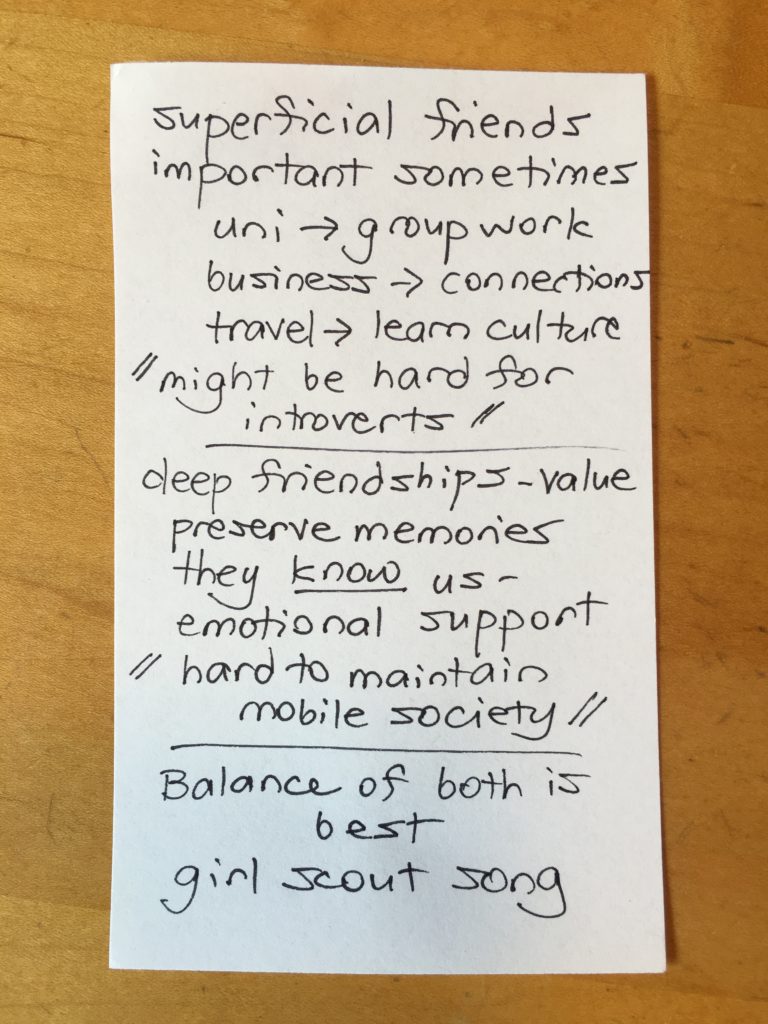
Now, here’s my essay which, as you can see, does not contain three reasons for agreeing or disagreeing with the statement but nonetheless fully addresses the topic.
♥ ♥ ♥ ♥ ♥ ♥
My Essay
When I think about friendships, the words to a little song I learned as a Brownie Girl Scout come to mind: Make new friends, but keep the old; one is silver and the other, gold. Although a bit simplistic, I believe these lyrics truly reflect a wise and balanced approach to friendship.
Having the ability to make lots of friends quickly and easily can certainly provide us with advantages in many different settings. For example, university students engaged in a group project may not know their team members to begin with, but quickly establishing a sense of friendship and rapport can help the group to work more effectively. Business people who can strike up friendships at a work conference may find these connections valuable during a later job search. Even while traveling, making friends with some local residents can give tourists insights into the culture of the place they are visiting. Thus, although introverts might find it a challenge, easily making new friends definitely provides some pluses.
Maintaining deeper friendships also offers advantages. With our old friends, we can revisit long-lost memories … places and people that we might otherwise forget. Our long-time friends really KNOW us, inside and out; we can be honest and open about our challenges and struggles. For this reason, when we are suffering physically or emotionally, these are the friends we are more likely to turn to. However, in today’s mobile society, many of us have trouble maintaining these ties as we move from place to place, even country to country.
Because both types of friendships provide important benefits, I believe that the best strategy is to find a balance of both kinds. We should definitely make the effort to maintain long-term friendships whenever possible. In these days of email and social media, distance should not necessarily present an insurmountable obstacle to staying in touch. On the other hand, we should also overcome any natural shyness and work hard to make connections with those we encounter in everyday life … from our workplace to our gym, from our place of worship to our neighborhood.
As I learned when I was a Brownie Scout, old friendships are golden. Nothing can ever replace those friends who are there for us no matter what the circumstances. But “silver” friends, the ones who pass through our life more easily, are still valuable and make the world a happier place for us all.
♥ ♥ ♥ ♥ ♥ ♥
Now let’s proceed to the second question.
Do you agree or disagree with the following statement?
Because modern life is very complex, it is essential for young people to have the ability to plan and organize.
Again, three points pop fairly quickly into my mind. Based on my own experience, I know that everyone, not just young people, benefits from organization. But thinking about my own children, I also know that young people face particular challenges. However, I also believe that people should take time to relax.
Here are my notes:
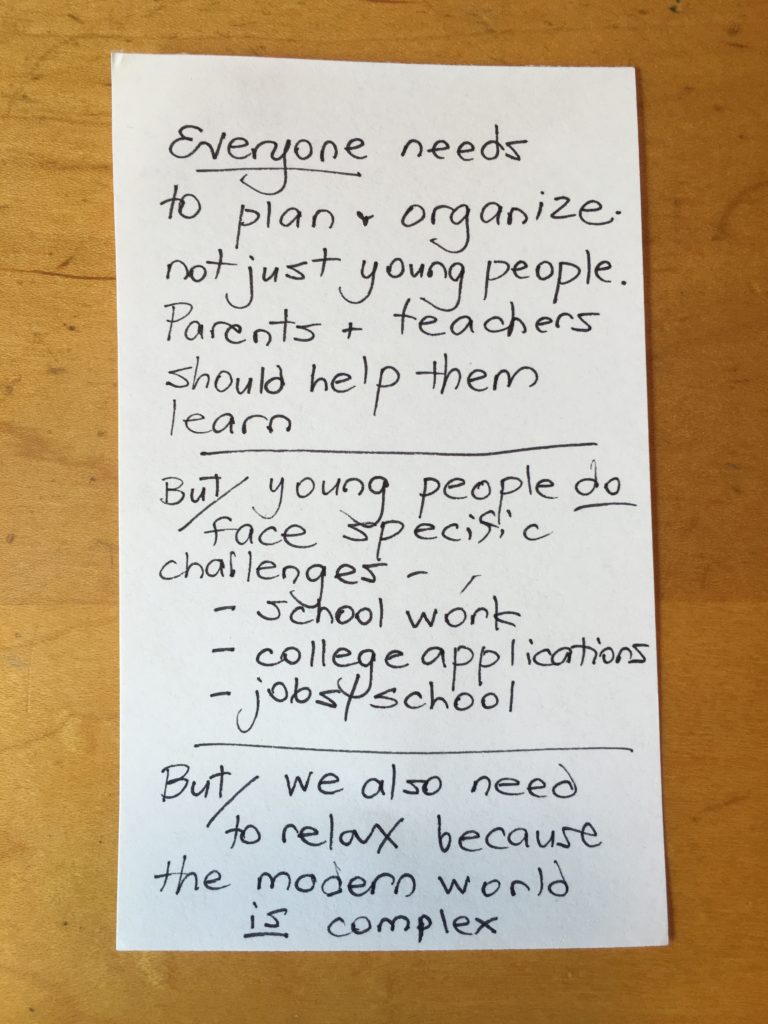
♥ ♥ ♥ ♥ ♥ ♥
My Essay
When I consider the number of half-used planners, checklists, and to-do lists cluttering my house, I realize that although I’m certainly not young, I definitely want and need to organize my life. And although young people, like older adults, have specific needs and goals to plan for, it’s also important that everyone takes some time to relax and live spontaneously as well.
Compared to a hundred years ago, modern life is indeed complex and fast-paced. With agendas filled with appointments, emails bombarding us constantly, and work hours that stretch from sunrise to sunset, just about everyone needs to plan and organize. Young people will need to cultivate these skills, and it is definitely the responsibility of parents and teachers to help them succeed. From toddlers who are given simple tasks like putting away their toys to high school students with full class schedules and part-time jobs, young people must begin learning these life lessons.
In addition, young people face particular challenges that adults do not, and they need to plan and organize for these. High school students, with the help of guidance counselors, must schedule their classes to ensure a well-rounded college prep curriculum. They often need to prepare multiple college applications that require much planning and organization. And especially in the US, they may also have to juggle schoolwork with the responsibility of part-time jobs. Young people living in a simpler time and place rarely had to deal with these complex challenges.
However, whether a person is young or elderly, and no matter what their position or responsibilities, planning and organizing should not be a full-time occupation. The modern world is both complex and stressful, sometimes unhealthily so. Therefore, young people as well as adults should be encouraged to take occasional breaks when they throw their schedules to the wind and enjoy spontaneous, unplanned, unpressured FUN. Without these periodic opportunities to relax, life would become unbearably tense and unhealthy to both mind and body.
As a mother of three, I encouraged my own children to plan and organize. From household chores to applying to colleges, they honed those abilities so that they could face adult responsibilities more successfully. But we never hesitated to enjoy times when we broke free of the stress and pressure – whether to walk to the ice cream store or go to the swimming pool. Hopefully they learned that a happy, successful life in this modern world requires both planning and spontaneity.
♥ ♥ ♥ ♥ ♥ ♥
I hope these essays encourage you to think outside the “three reasons box” … because confining yourself to that type of response limits your ability to generate ideas and express what you really think.
Too … !

Too, spelled with two o’s, is a very common word in English, but one that is sometimes used incorrectly.
Using too as an adverb modifying a verb is pretty straightforward and easy. We can use it instead of also or as well.
Are you going to the movies? I’m going too.
Do you like scary movies? I like them as well.
Did you take TOEFL last week? I also took it.
Me too is frequently used to express agreement.
Speaker A: I thought that test was really hard.
Speaker B: Me too!
Using too as an adverb modifying an adjective or adverb is a bit trickier.
First of all, don’t confuse too with so. So can be used to mean really, very, or extremely.
That movie was so good! It was really amazing.
Too, on the other hand, has a negative meaning. It means to an excess.
That movie was too scary. I couldn’t even watch some of it.
That soup is too hot. I can’t drink it.
He’s driving too fast. He’s going to get stopped by the police.
She’s talking too fast. It’s hard to understand her.
We often use the phrases too much and too many. Remember that as adjectives (determiners), much is used with singular non-count nouns and many with plural nouns.
I ate too much dinner. It’s unhealthy to eat too much sugar. Those shoes cost too much money.
I had too many cookies. Fast food has too many calories. She has too many shoes.
We can also use too much as an adverb.
He slept too much. She talks too much. We have to study too much.
We can also use too much in a general, unspecific way.
Life was just too much for her. She needed a break.
Things have just been too much lately. I’m really depressed.
Way too is an informal way to intensify too.
I ate way too many chips. Our teacher gives us way too much homework. I was working way too hard.
Then, there’s too too, sometimes spelled too-too. It means going beyond the edge (over the edge, overboard) in terms of convention, acceptability, good taste, or common sense. We can use it as an adjective by itself or as an adverb modifying an adjective.
Her house is just too too. (Meaning that it might be over-decorated, too showy, too pretentious, too ornate, or over-the-top)
Her children are simply too too precious. (Depending on the tone of voice, this could mean that the speaker really thinks the children are precious (adorable, lovely, wonderful) or it could imply that although the parents think they are precious, the speaker doesn’t.)
In general, too as an adjective is a relatively weak word to use in more formal business or academic writing, so be careful not to overuse it. Good synonyms that specifically mean being to a higher degree than is desirable, permissible, or possible include:
excessively
overly
unduly
inordinately
disproportionately
How to improve your listening skills
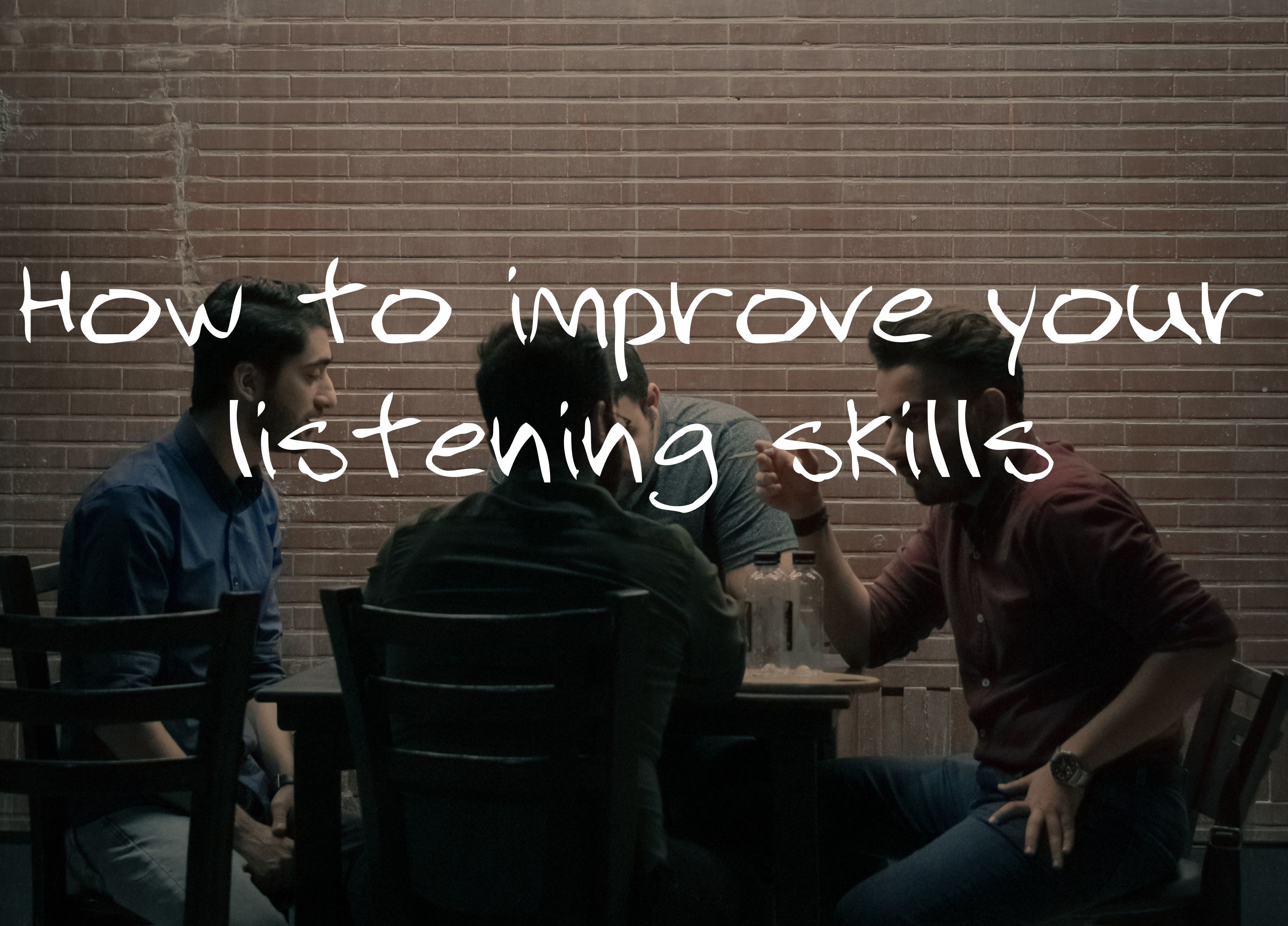
When I listen to an English broadcast, or to my colleagues talking in English, I can’t understand half of what I hear! Maybe if they slowed down a little … or used easier words … or avoided all that slang. It’s so frustrating! So how can I improve my English listening skills?
Ah, the million-dollar question!
Obviously, the only way you can improve is to listen more. Your ideal listening material, like your reading material, should be just slightly above your current level, so that you are able to understand almost all of what you hear (or read) but are still challenged to keep acquiring new vocabulary words, phrases, and structures. I definitely don’t recommend a steady diet of TOEFL lectures! They are fine for studying for the test itself, but if your goal is to gain English fluency in general (and I hope that is your goal!), listen to material that you actually enjoy.
Almost everyone knows about TED talks, American TV series and movies, podcasts, Voice of America, and YouTube. Here are some other resources you might consider.
Lots of current events topics. Can be adjusted to beginner, intermediate, and more advanced levels along with the original newscasts. Also offers opportunities for reading, writing, and speaking practice. Both British and American accents. Available as an app for both iPhone and Android.
Series of dialogues (conversations) recorded by a wide variety of Americans about compelling true stories from their lives. Transcripts are provided. Lots of different accents (not just “TOEFL English”), so excellent practice for understanding “real” Americans. Conversations are generally quite short (around five minutes) so easy to incorporate into daily study time. Also available as a podcast.
Long-running American public radio program featuring interviewer Terry Gross and an enormous variety of interviewees. Excellent preparation for TOEFL Listening conversations. Interviews are around 30 minutes long, with no transcript, so appropriate for more advanced levels. Also available as a podcast.
Both of these platforms offer MOOCs (massive open online courses) in a huge variety of subjects. Both are free although you will be offered the chance to buy a “certificate” for your participation. Most courses have limited availability, and there’s usually a six- to nine-week window when the course is open. You can leave the course at any time, or pick and choose what materials to focus on. Lots of material for both reading and listening, and transcripts and/or subtitles are usually provided. Also available as apps, but some features will not work in the app format. I have taken courses with both platforms and I don’t notice any significant differences between them; choose the class that interests you the most!
I’ve already covered my favorite listening platform in another blog post. You can receive a one-month free trial; after that, there’s a monthly fee. The variety of (educational but not always “academic”) topics, the outstanding professors, and the plethora of helpful graphics are the main drawing points for this platform. The Great Courses app works really well and allows you to watch or listen to lectures on your phone or tablet. Subscription is available world-wide, though European Union residents must subscribe through the app rather than the website.
If you are preparing for TOEFL Listening, check this article for more tips.
